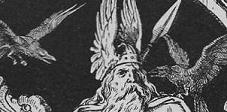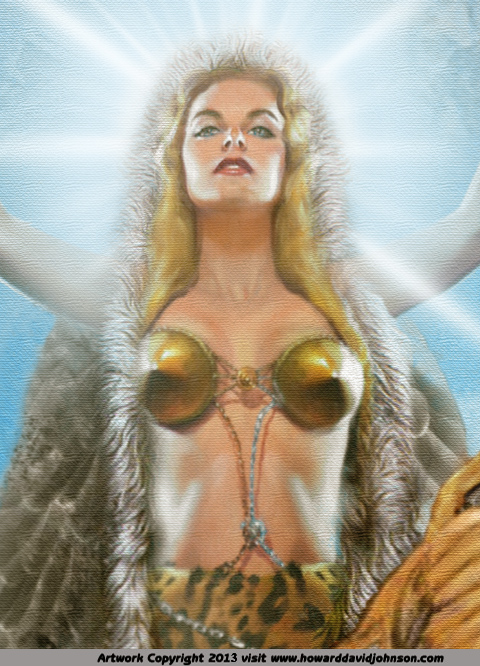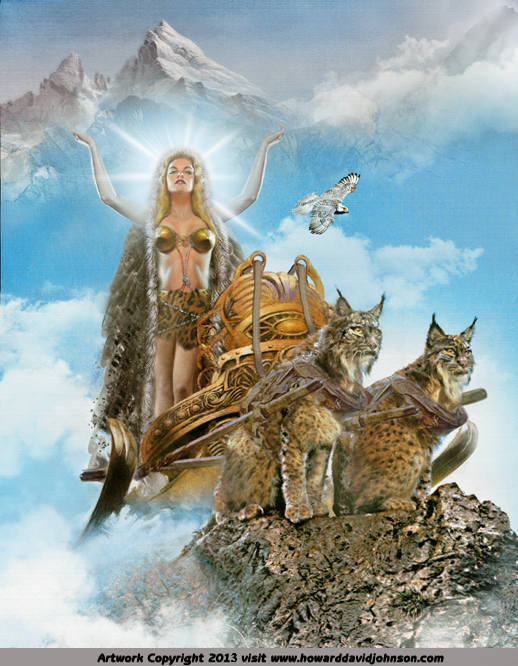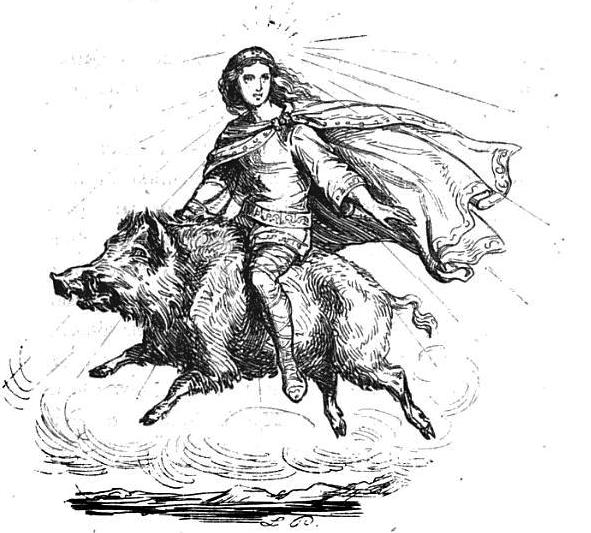The Poetic Edda: A Study Guide
The Speech of the Masked One

[PREVIOUS][MAIN][NEXT]
[HOME]
MS No. 2365 4to [R]
AM 748 I 4to [A]
Normalized Text:
Fólkvangr er in níundi,
en þar Freyja ræðr
sessa kostum í sal;
hálfan val
hún kýss hverjan dag,
en hálfan Óðinn á.
Fólkvangr er hin ix,
en þar Freyja ræðr
sessa kostum í sal;
hálfan val
hún kýss hverjan dag,
en hálfan Óðinn á.
14. Fólkvangr er inn níundi,
en þar Freyja ræðr
sessa kostum í sal;
hálfan val
hún kýss hverjan dag,
en hálfan Óðinn á.
in Icelandic Poetry
“The Song of Grimnir”
The Yale Magazine, Vol. 16
“The Song of Grimner”
XIV. Falcvanger's towers claim my song,
These to Freya's right belong;
Who chief presiding at each feast,
Appoints his place to ev'ry guest:
Half of the slain by her's possest,
But Odin daily claims the rest.
Folkvangr is ninth, and there hath Freya power
To seat her daily guests around the board;
Daily she chooseth unto herself the half
Of fallen heroes, and half Odin owneth.
in Edda Sæmundar Hinns Frôða
“The Lay of Grimnir”
in Corpus Poeticum Boreale
“The Sayings of the Hooded One”
14. Folkvang is the ninth,
there Freyja directs
the sittings in the hall.
She half the fallen chooses each day,
but Odin th’ other half.
where Freyja orders the seats in the hall:
she chooses half the slain every day,
but Woden the other half.
in Edda Saemundar
“The Sayings of Grimnir”
in The Poetic Edda
“Grimnismol: The Ballad of Grimnir”
14. The ninth is Folk-field; Freyja rules there
choice of seats in the hall :
one half the dead she chooses each day
but half the War-father owns.
14. The ninth is Folkvang, where Freya decrees
Who shall have seats in the hall;
The half of the dead each day does she choose,
And half does Othin have.
in The Poetic Edda
“The Lay of Grimnir”
in The Elder Edda
“The Lay of Grimnir”
14. Folkvang the ninth, where Freya chooses
who seats shall have in her hall:
half of the slain are hers each day,
and half are Othin's own.
14. The ninth Battle-Plain, where bright Freya
Decides where the warriors shall sit:
Half of the fallen follow the goddess,
And half belong to Odin.
in The Poetic Edda
“Grimnir’s Sayings”
in The Eddas: The Keys to the Mysteries of the North
The Lay of Grimnir
14. Folkvang is the ninth, and there Freyia arranges
the choice of seats in the hall;
half the slain she chooses every day,
and half Odin owns.
14. The ninth is Folkvang, and there,
Freyja assigns seats in the hall.
She chooses half the slain each day
and Odin has half.
The Elder Edda: A Book of Viking Lore
'The Lay of Grimnir"
in The Poetic Edda, Vol. III: Mythological Poems
“The Lay of Grimnir”
14. ‘Battle-field the ninth, where Freyja arrays
the choice of seats in the hall;
from half the slain she makes her choice each day:
the other half Odin has.
and there Freyja determines
the right rank of seating in the hall.
Half of the slain
she elects every day,
and half Óðinn has.

Freyja by Howard David Johnson
[HOME][GRÍMNISMÁL]
XXIV. Frá Frey ok Freyju
Njörðr í Nóatúnum gat síðan tvau börn. Hét annat Freyr, en dóttir Freyja. Þau váru fögr álitum ok máttug. Freyr er inn ágætasti af ásum. Hann ræðr fyrir regni ok skini sólar ok þar með ávexti jarðar, ok á hann er gott at heita til árs ok friðar. Hann ræðr ok fésælu manna. En Freyja er ágætust af ásynjum. Hon á þann bæ á himni, er Fólkvangr heitir. Ok hvar sem hon ríðr til vígs, þá á hon hálfan val, en hálfan Óðinn, svá sem hér segir:
Folkvangr heitir,
en þar Freyja ræðr
sessa kostum í sal;
halfan val
hon kýss hverjan dag,
en halfan Óðinn á.
Salr hennar Sessrúmnir, hann er mikill ok fagr. En er hon ferr, þá ekr hon köttum tveim ok sitr í reið. Hon er nákvæmust mönnum til á at heita, ok af hennar nafni er þat tignarnafn, er ríkiskonur eru kallaðar fróvur. Henni líkaði vel mansöngr. Á hana er gott at heita til ásta."
Gylfaginning 24 [Broedur tr.]:
"Njördr in Nóatún begot afterward two children: the son was called Freyr, and the daughter Freyja; they were fair of face and mighty. Freyr is the most renowned of the Æsir; he rules over the rain and the shining of the sun, and therewithal the fruit of the earth; and it is good to call on him for fruitful seasons and peace. He governs also the prosperity of men. But Freyja is the most renowned of the goddesses; she has in heaven the dwelling called Fólkvangr ("Folk-plain, Host-plain"), and wheresoever she rides to the strife, she has one-half of the kill, and Odin half, as is here said:
Fólkvangr 'tis called,
where Freyja rules
degrees of seats in the hall;
Half the kill
she keepeth each day,
and half Odin hath.
"Her hall Sessrúmnir ("Seat-roomy") is great and fair. When she goes forth, she drives her cats and sits in a chariot; she is most conformable to man's prayers, and from her name comes the name of honor, Frú, by which noblewomen are called. Songs of love are well-pleasing to her; it is good to call on her for furtherance in love."
 Freyja's Chariot Prints Available from The Johnson Galleries |
That’s all we know of Folkvang. This is rather surprising since the place itself is the equal of Valhalla. Yet, we find Freyja associated with Valhall in other sources.
For example, Skáldskaparmál 24 informs us that once Odin rode
his eight-legged horse Sleipnir into Jötunheim, where he encountered the giant
Hrungnir. When Hrungnir asked what manner of man rode through air, remarking
what a wondrous horse the stranger had, Odin boasted and bet his head that no
finer steed could be found in Jotunheim. Accepting the challenge, Hrungnir
mounted his horse Gullfaxi and hurried after Odin. They galloped so furiously
that Hrungnir paid no heed until they came beyond the gates of Asgard. Once
inside, the Æsir invited him to drink. According to this source, Freyja herself
served him mead in Valhall:
Hann gekk í höllina ok bað fá sér at drekka. Váru þá teknar þær skálir, er
Þórr var vanr at drekka af, ok snerti Hrungnir ór hverri. En er hann gerðist
drukkinn, þá skorti eigi stór orð. Hann lézt skyldu taka upp Valhöll ok færa í
Jötunheima, en sökkva Ásgarði, en drepa goð öll, nema Freyju ok Sif vill hann
heim hafa með sér, en Freyja ein þorir þá at skenkja honum, ok drekka lézt hann
mundu allt ásaöl. En er ásum leiddust ofryrði hans, þá nefna þeir Þór.
“He went within and ordered drink to be brought to him, and then those flagons
were brought in from which Thor was wont to drink; and Hrungnir swilled from
each in turn. But when he had become drunken, then big words were not wanting:
he boasted that he would lift up Valhall and carry it to Jötunheim, and sink
Ásgard and kill all the gods, save that he would take Freyja and Sif home with
him. Freyja alone dared pour for him; and he vowed that he would drink all the
ale of the Æsir. But when his overbearing insolence became tiresome to the Æsir,
they called on the name of Thor.
Því næst kom Þórr í höllina ok hafði á lofti hamarinn ok var allreiðr ok
spyrr, hverr því ræðr, er jötnar hundvísir skulu þar drekka, eða hverr seldi
Hrungni grið at vera í Valhöll eða hví Freyja skal skenkja honum sem at gildi
ása. Þá svarar Hrungnir ok sér ekki vinaraugum til Þórs, sagði, at Óðinn bauð
honum til drykkju ok hann var á hans griðum.
"Straightway Thor came into the hall, brandishing his hammer,
and he was very wroth, and asked who had advised that dog-wise giants be
permitted to drink there, or who had granted Hrungnir safe-conduct to be
in Valhall, or why Freyja should pour for him as at a feast of the Æsir.
Then Hrungnir answered, looking at Thor with no friendly eyes, and said
that Odin had invited him to drink, and he was under his safe-conduct.”
In the poem Hyndluljóð, Freyja conducts the hero Óttar to Vahall. In
verse 7 (cf. 45), we learn that he is her lover, concealed in the shape
of a boar named Hildsvini (‘Battle-swine). The name Óttar at once makes
us think of Freyja’s husband Óðr.
 Freyja on Hlidsvini by Ludwig Pietsch 1865 |
|
|
Freyja kvað: |
Freyja said: 1. "Wake, maid of maids! Wake, my friend! Hyndla! Sister! who in the cavern dwellest. Now there is a dark of darks; we will both to Valhall ride, and to the holy fane." |
To which Hyndla replies:
|
Flá ertu, Freyja, |
6. "False art thou, Freyja! who tempest me: by thy eyes thou showest it, so fixed upon us; while thou thy man hast on the dead-road, the young Ottar, Innstein's son." |
|
Freyja kvað: |
Freyja said: 7. "Dull art thou, Hyndla! methinks thou dreamest, since thou sayest that my man is on the dead-road with me; there where my hog sparkles with its golden bristles, named Hildisvini, which for me made the two skilful dwarfs, Dain and Nabbi." |
These direct references open up the real possibility that Freyja is connected with Valhall in some way.
In the late Eddic poem Fjölsvinnsmál, we may catch another glimpse of Freyja’s home. The poem, known for its fairy-tale-like motifs, draws heavily on the old heathen mythology. When the poem opens, the hero Svipdag approaches the gates of a castle, which in clues derived from the ensuing verses, makes us think foremost of Asgard and its environs. Svipdag is met at the gate by Fjölsviðr, a name of Odin in Grímnismál 48. Fjölviðr owns two wolf-hounds, Geri and Gifr (cf. Geri and Freki in Grímnismál 22). The branches of “Mimir’s Tree”, Mimameiður, “whose branches extend through all lands” shade this enclosure (19, 20); and “no one knows from what root it springs”. Based on these descriptions, reminiscent of Hávamál 138, this tree is most often identified as Yggdrasil.
In verse 12 , Fjölsviðr says he made the walls himself from “Leir-brimir’s limbs”. The name Leir-brimir signifies “muck-Brimir”. In Völuspá 9 the dwarves are formed “from Blainn’s bones and Brimir’s blood” [ór Brimis blóði ok ór Bláins leggjum], According to Andy Orchard, and supported by numerous other scholars: “Brimir (‘Sea’) and Bláin (‘The Blue One’) may be alternate names for Ymir.” Just as Fjölsviðr did, Snorri informs us that Odin and his brothers built the world, and presumably Asgard, from Ymir’s limbs, and that the dwarves were formed from maggots growing in his flesh. These statements naturally explain the allusions in Fjölsvinsmál 12 and Völuspá 9. In addition, Vafþrúðnismál 29 informs us that Aurgelmir is an alternate name for Ymir, a fact Snorri confirms. Aur- of course means mud, or loam; and is a synonym of leir-. The context of the poem makes it clear that this place is the home of the gods. It is Odin himself meets the hero Svipdag at the gate, engaging him in a contest of wisdom, before he enters and claims Menglad as his bride.
Inside the gate sits Menglad, whose name means the one ‘fond of necklaces’, an appropriate name for Freyja, the owner of the brilliant jewel Brisinga-men, ‘the best ornament under heaven.” Like Freyja, Menglad waits for her husband’s return (cf. 46, 49). Verse 40 says in definite terms that she is a goddess, worthy of worship, a point also made concerning Freyja in Hyndluljóð 10. She is attended by no less than eight handmaids. Together, they are nine in number. “Njörd’s daughter” is a frequent kenning for Freyja, and the poem Solarljóð, verse 79, tells us that Njörd’s daughters are also nine in number. Can there by any doubt whom the author of the poem intended?
If Menglad is Freyja, then we have another account of her dwelling in Asgard.
Within the gate, Svipdag sees golden halls (5: gullna salr). We are told that Menglad “reigns here and holds power over these lands and costly halls. (8: ríki hefur eign og auðsölum). When Svipdag asks the name of the hall he sees before him, Fjölsviðr answers:
|
Hýr hann heitir,
|
32. It is called
Hyr, and it will long tremble on the point of a sword; this rich mansion forever shall be known to men only by hearsay. |
Outside, Menglad sits on a mound, surrounded by her attendants. Their subordinate position at her feet, suggests that she is a high-ranking goddess. Among them is Eir, the goddess of healing, and the giantess Aurboda, who is the mother of Frey’s wife Gerd, Freyja’s sister-in-law (Fjölsvinnsmál 38, cf. Hyndluljóð 40).
|
Lyfjaberg það heitir,
|
36. Lyfjaberg it is
named, and it has long been a solace to the sick and sore; a woman will be cured, even of the year-malady, should she climb it. |
The name of the hall, Hyrr, usually interpreted as "fire", can also be read as Hýr, "sweet, smiling, mild", and understood as a reference to Valhall. Grímnismál 8 states that Valhall is situated in Glaðsheimur, "world of gladness, world of joy". Glaður and hýr are synonymous, and thus Hýr may be a riddle, consistent with the tone of the rest of the poem. Fjolsviðr says that this hall "trembles on the point of a sword". Broddur means "sword", as well as any "weapon with a sharp point." Men who die in battle come to Valhall, and according to Ynglingasaga, warriors worthy of Valhall who die a ‘straw-death’ mark themselves with a spear to ensure their entry here. To enter this place, one must be pierced with a broddr, a sharp weapon. The choice of the word bifast “to tremble” may have been well chosen for its resonance with Bif-röst, ‘the trembling way’, the bridge upon which the chosen enter Asgard. Finally, the statement in 32: 4-6 is wholly applicable to Valhall: it is a place which no living man can know, except by hearsay. Only the dead may enter here.
While Grímnismál 14 indicates that Freyja has a hall of her own where she entertains half of the chosen, two, and perhaps three, other sources associate her directly with Valhall. So might Folkvang, a name found only here and in Snorri's text, and Sessrumnir, a name found only in Snorri's Edda, simply be alternate names for Gladsheim and Valhall?
The evidence is simply too limited to draw any firm conclusions.
.jpg)
Freyja rides Ottar by Nayruchan
[PREVIOUS][MAIN][NEXT]
[HOME]